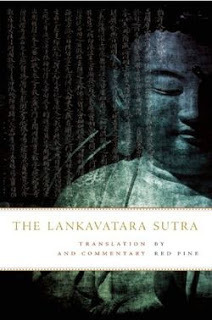THE LANKAVATARA SUTRA

First off, does anyone want a cat? His name is Crum and he is the best cat in the world. He belongs to my neighbor, Kim. But she can't keep him. He's been staying at my apartment for the last couple days. But at some point I'm gonna need to leave for an extended period, and then do that over and over and over again. So this isn't gonna last for long.
This cat is so sweet it's unreal. This is a photo of him keeping me company this morning while I wrote what you're reading now.
Oh. And someone find me a teaching gig in Southern California. Thanks.
Oh! And doesn't anyone out there want me to come speak anywhere? It's weird. I was getting so many offers I couldn't handle them last year and now here in 2012 -- nothing! Did I do something that offended everyone?
Now onto the main topic.
The nice folks over at Counterpoint Books sent me a review copy of Red Pine's The Lankavatara Sutra: Translation and Commentary. Thank you, Counterpoint Books!
I gotta say that I was kind of intimidated at first. I don't do sutras very well. I managed to dig through Dogen's Shobogenzo and even write a book about it. But that doesn't mean I'm one of those guys who sits around reading ancient Buddhist texts for fun. Generally speaking ancient Buddhist writings baffle me about as much as they baffle everybody else.
Take the Lotus Sutra -- please! I mean, I know I'm supposed to love the thing. I know that Dogen loved it. People I know have read it and said it's the greatest thing since sliced cheese. But I have never been able to get through the confounded thing. I can't get past the part where the author is telling you the names of all the Bodhisattvas and their uncles and how many Buddha realms they've conquered and where they shop for shoes and why you should definitely copy the sutra a thousand times and how many dragon kings were sitting around while Buddha impressed everyone by shooting rays out of his forehead... and so on and on and on and on.
You think I'm making this up? Have a look for yourself.
So when I saw this book in my mailbox, I thought, "Good gosh, now I gotta read the thing!"
It turns out that the Lankavatara Sutra is much easier going than the Lotus Sutra. At least for me. It doesn't take nearly as long to get to the point. And its philosophical doctrines aren't expressed in extended metaphors or stories. In many ways it's a much more modern sounding piece. The author of the sutra frames it as a long Q&A session between a guy named Mahamati and Buddha. Of course, Buddha was long since dead by the time this sutra was composed. But the literary device works to express a lot of the then-developing theories in Buddhism that would later become the basis for much of what is taught in Zen Buddhist temples even today.
What really makes this book work for me is Red Pine's (aka Bill Porter) introduction. It's a very honest essay. The author even says that it was his need for the advance money from his publishers that really tipped the scales and finally got him working on the translation in earnest. Apparently he'd had it on the back burner for years. But when he ran out of other sutras to translate, he reluctantly went back to the Lankavatara.
I'm happy he did because it's a very good book. It's not an easy book to read. Nor would I recommend it to someone just starting out with Buddhist philosophy. Stick to Zen Mind, Beginner's Mind or even Hardcore Zen if you want that. Or you can try one of the books on my Zen Books That Don't Suck page.
But if you've already got a foundation of basic Buddhist philosophy and you want to know where some of the peculiarly Zen stuff comes from, this is a pretty interesting and valuable book. It's a fine resource for some of the earliest manifestations of what coalesced into the Zen approach to Buddhist teaching and practice.
For example, you know how I'm always ranting against people who try to sell the idea of instant enlightenment? Remember how I compared thinking you could get enlightened right away to thinking you could learn to play Eruption by Eddie Van Halen after a single guitar lesson? Some of you assumed I just pulled that out of my ass. Well, in fact, I did. But in the Lankavatara Sutra, Mahamati asks, "How is the stream of perceptions of beings' minds purified?" Buddha answers, "By degrees and not all at once... like when people become proficient in such arts as music or writing or painting." So there!
On the matter of God, Mahamati asks, "In the sutras the Bhagavan (aka Buddha) says that the tathagatha-garbgha (womb of the Buddhas) is intrinsically pure, endowed with thirty-two attributes and present in the bodies of all beings, and that, like a precious jewel wrapped in soiled clothing, the ever-present unchanging tathagatha-garbha is likewise wrapped in the soiled clothing of the skandhas, dhatus and ayantas and stained with the stains of erroneous projections of greed, anger and delusion. How is it that what the Bhagavan says about the tathagatha-garbha is the same as what followers of other paths say about a self? Bhagavan, followers of other paths also speak of an immortal creator without attributes, omnipresent and indestructible. And they say this is the self."
Buddha says, among other things that, "The tathagatha-garbha is taught to attract those members of other paths who are attached to a self so that they will give up their projection of an unreal self and will enter the threefold gate of liberation." This doesn't mean there is no tathagatha-garbha. Just that Buddha considers it a better way to describe reality than to describe it as self.
Like I said, I'm working on a whole book to explain why I think it makes sense to use the word "God" in the context of contemporary Buddhism. And it's not just to play nice with religious folks. But I'm not gonna try and get into that here. It's just nice to see that this question goes back a very long way.
 In any case, the foregoing quotes ought to give you an idea what to expect from a book like this. If you don't know what a skandha or a dhatu is you're going to have a tough time. Red Pine assumes his readers know at least the basic terms. However, he provides copious footnotes which are presented such that the sutra itself is on the page on your right and the footnotes are on the page on your left. This makes it very easy to go from one to the other. You don't have to skip to the back of the book or even to the bottom of the page to find them. This is very nice for people like me with short attention spans who forget what the term they're looking up even was by the time we manage to find the footnote explaining it. And there's a glossary of terms at the end in case you really do need to know what a skandha is.
In any case, the foregoing quotes ought to give you an idea what to expect from a book like this. If you don't know what a skandha or a dhatu is you're going to have a tough time. Red Pine assumes his readers know at least the basic terms. However, he provides copious footnotes which are presented such that the sutra itself is on the page on your right and the footnotes are on the page on your left. This makes it very easy to go from one to the other. You don't have to skip to the back of the book or even to the bottom of the page to find them. This is very nice for people like me with short attention spans who forget what the term they're looking up even was by the time we manage to find the footnote explaining it. And there's a glossary of terms at the end in case you really do need to know what a skandha is.I highly recommend this book for people who want to deepen their understanding of Zen Buddhist philosophy.
Published on February 04, 2012 09:50
No comments have been added yet.
Brad Warner's Blog
- Brad Warner's profile
- 595 followers
Brad Warner isn't a Goodreads Author
(yet),
but they
do have a blog,
so here are some recent posts imported from
their feed.



